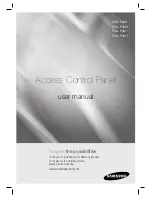
B-2
MPC860 PowerQUICC UserÕs Manual
MOTOROLA
Appendixes
these individual transfers can be performed at up to the peak rate. Over time, however, the
average amount of data transferred must not exceed the average rate which the CPM can
process.
If any of the conditions outlined above are not satisÞed, then the rate at which the serial
channels are clocked must not exceed the rate at which the CPM can process data from
them. In other words, the average rate limitation must also be treated as the peak rate
limitation.
The I
2
C channel is the only exception to these rules. Its maximum serial transfer rate is
limited by its hardware, not by the rate at which the CPM services it. At its maximum
transfer rate, it will only consume 25% of the CPM bandwidth.
B.2 Bus Utilization
Given the width and clock speed of the system bus of the MPC860, bus utilization is not a
critical system limitation, considering the data rates supported by the MPC860.
SpeciÞcally, the peak system bus transfer rate of a 50MHz MPC860 (using single-beat
transfers to zero wait-state memory) is 800Mbps, whereas the maximum aggregate serial
data rate supported at that frequency is usually less than 50Mbps.
However, whereas bus utilization is not a major consideration, bus latency can be. Extreme
periods of bus latency could potentially cause a FIFO to overrun or underrun. Where this is
a more critical issue, some speciÞc recommendations are made. For example,
recommendations for system bus latency are made for an MPC860MH operating in QMC
mode; see the QMC Supplement to MC68360 and MPC860 User's Manuals.
B.3 CPM Bandwidth (Average Rate Limitation)
The communications processor module (CPM) is a single shared resource used by all of the
serial channels. It handles low-level protocol processing tasks and manages DMA for all of
them. In the architecture of the MPC860, the CPM is the central communications
processing engine, to which the individual serial controllers (SCC, SMC, SPI, I
2
C, and PIP)
make requests for service. Therefore, the serial channels must not request more service than
the CPM can provide; else, FIFO underrun or overrun errors will result.
The amount of processing required by a particular serial channel depends on the mode in
which the channel is conÞgured, and the maximum rate at which the channel requests
service. [While this rate is usually equivalent to the serial clocking rate, under certain
conditions the serial clocking rate could be higher; this is because the FIFOs of the serial
channels can provide a Ôlocal averagingÕ effect on the data rate, and thus can handle short
bursts. See Section B.1, ÒSerial Clocking (Peak Rate Limitation).Ó]
Summary of Contents for MPC860 PowerQUICC
Page 3: ...MPC860UM AD 07 98 REV 1 MPC860 PowerQUICC ª UserÕs Manual ...
Page 36: ...xxxvi MPC860 PowerQUICC UserÕs Manual MOTOROLA CONTENTS Paragraph Number Title Page Number ...
Page 78: ...I iv MPC860 PowerQUICC UserÕs Manual MOTOROLA Part I Overview ...
Page 88: ...1 10 MPC860 PowerQUICC UserÕs Manual MOTOROLA Part I Overview ...
Page 114: ...3 16 MPC860 PowerQUICC UserÕs Manual MOTOROLA Part I Overview ...
Page 226: ...8 32 MPC860 PowerQUICC UserÕs Manual MOTOROLA Part II PowerPC Microprocessor Module ...
Page 262: ...9 36 MPC860 PowerQUICC UserÕs Manual MOTOROLA Part II PowerPC Microprocessor Module ...
Page 274: ...III iv MPC860 PowerQUICC UserÕs Manual MOTOROLA Part III Configuration ...
Page 320: ...12 12 MPC860 PowerQUICC UserÕs Manual MOTOROLA Part III Configuration ...
Page 325: ...MOTOROLA Part IV Hardware Interface IV v Part IV Hardware Interface ...
Page 326: ...IV vi MPC860 PowerQUICC UserÕs Manual MOTOROLA Part IV Hardware Interface ...
Page 352: ...13 26 MPC860 PowerQUICC UserÕs Manual MOTOROLA Part IV Hardware Interface ...
Page 394: ...14 42 MPC860 PowerQUICC UserÕs Manual MOTOROLA Part IV Hardware Interface ...
Page 426: ...15 32 MPC860 PowerQUICC UserÕs Manual MOTOROLA Part IV Hardware Interface ...
Page 530: ...17 26 MPC860 PowerQUICC UserÕs Manual MOTOROLA Part IV Hardware Interface ...
Page 632: ...21 44 MPC860 PowerQUICC UserÕs Manual MOTOROLA Part V The Communications Processor Module ...
Page 660: ...22 28 MPC860 PowerQUICC UserÕs Manual MOTOROLA Part V The Communications Processor Module ...
Page 708: ...24 24 MPC860 PowerQUICC UserÕs Manual MOTOROLA Part V The Communications Processor Module ...
Page 748: ...27 20 MPC860 PowerQUICC UserÕs Manual MOTOROLA Part V The Communications Processor Module ...
Page 846: ...31 20 MPC860 PowerQUICC UserÕs Manual MOTOROLA Part V The Communications Processor Module ...
Page 914: ...35 12 MPC860 PowerQUICC UserÕs Manual MOTOROLA Part V The Communications Processor Module ...
Page 948: ...36 34 MPC860 PowerQUICC UserÕs Manual MOTOROLA Part V The Communications Processor Module ...
Page 998: ...37 48 MPC860 PowerQUICC UserÕs Manual MOTOROLA Part VI Debug and Test ...
Page 1016: ...A 10 MPC860 PowerQUICC UserÕs Manual MOTOROLA Appendixes ...
Page 1024: ...B 8 MPC860 PowerQUICC UserÕs Manual MOTOROLA Appendixes ...
Page 1030: ...C 6 MPC860 PowerQUICC UserÕs Manual MOTOROLA Appendixes ...
Page 1086: ...Glossary 12 MPC860 PowerQUICC UserÕs Manual MOTOROLA ...
Page 1106: ......
















































